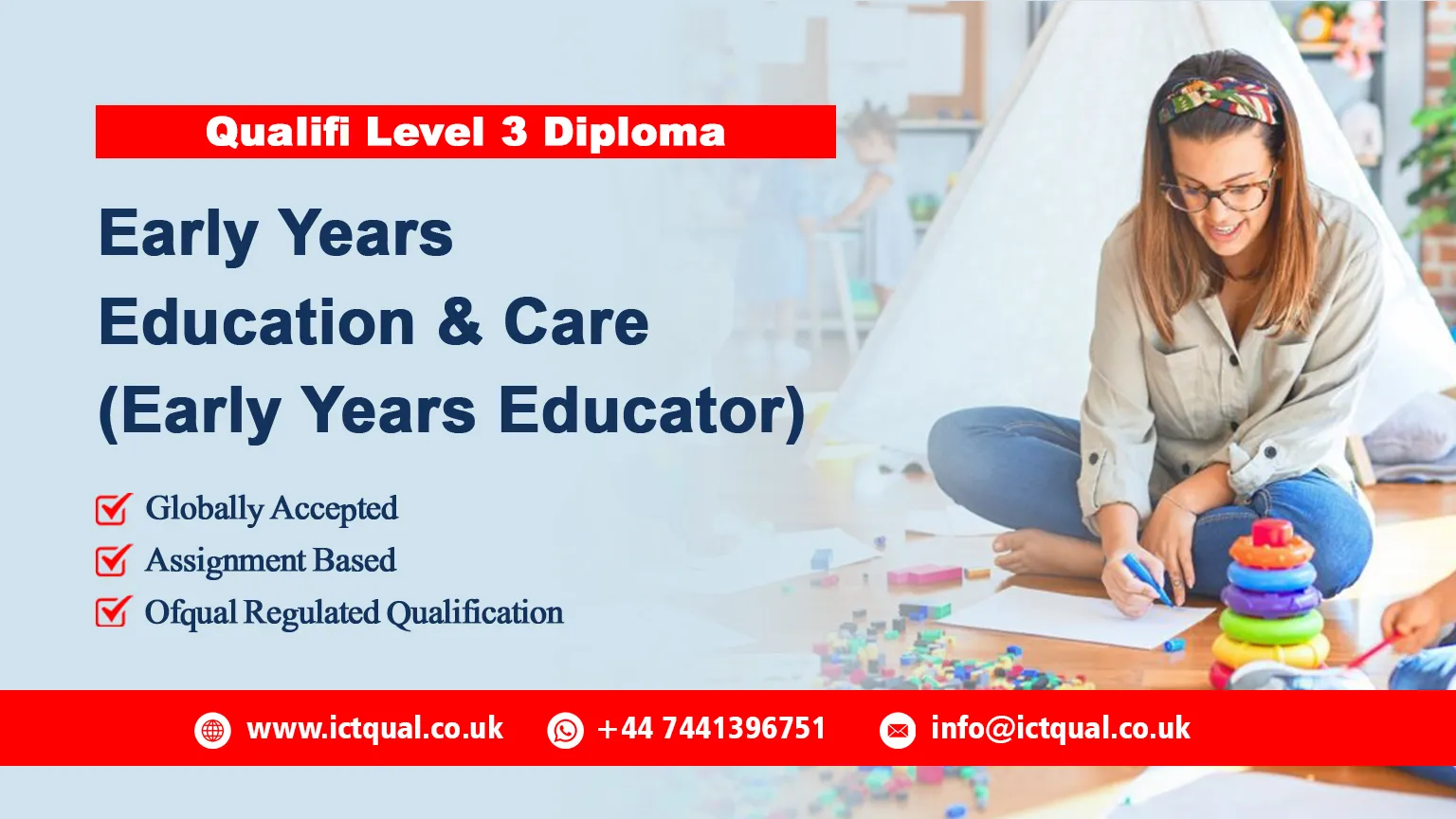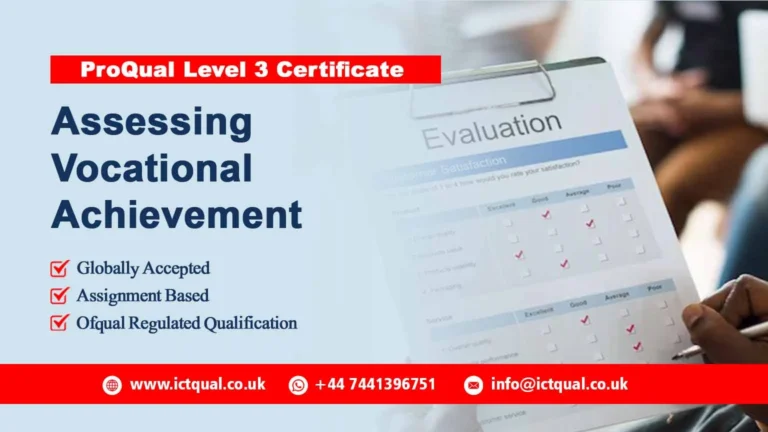In a world where the early years of a child’s life lay the foundation for their future, the role of early years educators has never been more crucial. The Qualifi Level 3 Diploma in Early Years Education and Care (Early Years Educator) is an invaluable qualification for those passionate about making a difference in young children’s lives. This diploma offers a comprehensive pathway to becoming a skilled and effective early years educator, equipped with the knowledge and practical experience needed to excel in this rewarding field.
The Qualifi Level 3 Diploma in Early Years Education and Care (Early Years Educator) is a specialized qualification designed to provide a deep understanding of early childhood development and the skills required to support children’s growth and learning in their formative years. The course covers essential areas such as child development, curriculum planning, and safeguarding, preparing students to work effectively in various early years settings, including nurseries, preschools, and primary schools.
Individuals looking to transition into early years education from other fields will benefit from the comprehensive training and practical experience provided by the diploma.
Enrollment procedures for the Qualifi Level 3 Diploma in Early Years Education and Care may vary depending on the institution offering the course. Typically, you can enroll through the institution’s website or by contacting their admissions office for detailed information on application requirements and deadlines.
The Qualifi Level 3 Diploma in Early Years Education and Care (Early Years Educator) is a comprehensive qualification that prepares individuals to make a meaningful impact in the field of early childhood education. By combining theoretical knowledge with practical experience, the diploma ensures that graduates are well-equipped to support young children’s development and learning.
Whether you’re starting your career, seeking formal qualifications, or transitioning into a new field, this diploma offers a valuable pathway to becoming a skilled and effective early years educator. Embrace the opportunity to shape young minds and contribute to their future success with this essential qualification.
The Qualifi Level 3 Diploma in Early Years Education and Care (Early Years Educator) is a comprehensive qualification designed to equip individuals with the essential skills and knowledge required to excel in early childhood education. This course offers a deep dive into child development, teaching strategies, and practical care techniques, preparing students to support the growth and learning of young children effectively. The diploma covers critical areas such as child safety and safeguarding, inclusive education, and the creation of engaging learning environments.
Through a blend of theoretical learning and hands-on experience, including practical placements in early years settings, students gain valuable insights into how to foster children’s cognitive, emotional, and social development. This qualification not only provides a solid foundation for a career in early years education but also emphasizes the importance of ongoing professional development and reflective practice.
Whether you’re starting your journey in early years education or seeking to formalize your experience, this diploma offers the comprehensive training needed to make a positive impact on young children’s lives and advance in this rewarding field.
The Qualifi Level 3 Diploma in Early Years Education and Care (Early Years Educator) consists of 15 mandatory units of 83 credits for the completed qualification.
Mandatory Units
| Sr# | Unit Title |
|---|---|
| 1 | Supporting healthy lifestyles for children through food, nutrition and exercise |
| 2 | Supporting physical care routines for children and for unwell children |
| 3 | Promoting children’s emotional well-being, social and emotional development |
| 4 | Understanding the needs of the mother and baby pre-conception, during pregnancy and the first year of life |
| 5 | The role of the Early Years practitioner |
| 6 | Legislation relating to Early Years practice |
| 7 | Working in partnership |
| 8 | Supporting children through play in Early Years |
| 9 | Developing the literacy, mathematical and communication skills of children |
| 10 | Understand the needs of the child in preparing for school |
| 11 | Understanding children’s cognitive development |
| 12 | Promoting the physical development of children |
| 13 | Supporting children with additional needs |
| 14 | Using studies and tools to promote the development of children |
| 15 | Professional development for Early Years Educators |
This course is designed for:
1. Aspiring Early Years Educators
If you have a deep passion for working with young children and are interested in starting a career in early years education, this diploma is ideal. It provides the foundational knowledge and practical skills needed to work effectively in various early years settings, including nurseries, preschools, and primary schools.
2. Current Early Years Practitioners
For individuals already working in early years settings but seeking formal qualifications, this diploma offers a recognized credential that can enhance your professional standing. It helps you gain deeper insights into child development and best practices, potentially leading to career advancement and increased responsibilities.
3. Recent School Leavers
If you are a recent high school graduate interested in a career in early years education, this diploma provides a structured pathway into the field. It equips you with essential skills and knowledge, making it a strong starting point for those eager to embark on a career in nurturing and educating young children.
4. Career Changers
Individuals looking to transition from other professions into early years education will find this diploma highly beneficial. It offers comprehensive training and practical experience, making it easier to shift to a new career path and gain the qualifications needed to work effectively with young children.
5. Parents and Caregivers
Parents or caregivers who wish to gain a deeper understanding of child development and early education can benefit from this diploma. The knowledge and skills acquired can enhance your ability to support and guide your own children’s learning and development, as well as provide insights into best practices in early years care.
6. Educational Support Staff
If you work in a supportive role within educational settings and are looking to specialize in early years education, this diploma provides targeted training. It helps build on your existing experience and equips you with the expertise needed to contribute more effectively to early childhood programs.
7. Individuals Interested in Further Education
For those considering advanced qualifications in early years education or related fields, this diploma serves as a valuable foundation. It prepares you for further study and specialization, setting a strong groundwork for pursuing additional certifications or degrees.
8. Volunteers in Early Years Settings
Volunteers who work or wish to work with young children in various settings, such as community centers or after-school programs, will find this diploma beneficial. It provides a formal qualification that enhances your ability to contribute meaningfully and effectively in these environments.
Here are the outcomes for each of the listed study units:
Understand Child Development: Demonstrate a comprehensive understanding of child development theories and stages. Apply this knowledge to support the physical, emotional, social, and cognitive development of children in early years settings.
Implement Effective Teaching Strategies: Develop and apply effective teaching and learning strategies that cater to the diverse needs of young children. Create engaging and stimulating learning environments that promote active learning and curiosity.
Safeguard and Promote Well-being: Recognize and implement safeguarding policies and procedures to ensure the safety and well-being of children. Understand the legal and ethical responsibilities related to child protection and create a safe environment for children.
Plan and Assess Learning Activities: Design, implement, and assess age-appropriate educational activities and programs. Use observation and assessment techniques to monitor children’s progress and adapt activities to meet their individual needs.
Support Inclusive Practices: Foster an inclusive environment by addressing the needs of all children, including those with special educational needs and disabilities (SEND). Implement strategies that promote equality, diversity, and respect in the early years setting.
Communicate Effectively with Stakeholders: Develop effective communication skills to engage with children, parents, and colleagues. Build positive relationships and collaborate with others to support the educational and developmental needs of children.
Manage Early Years Environments: Understand and apply principles of health, safety, and hygiene within early years settings. Manage the physical environment effectively to support children’s learning and ensure a safe, clean, and organized space.
Reflect on Professional Practice: Reflect critically on your own practice and professional development. Identify areas for improvement, seek feedback, and engage in continuous learning to enhance your effectiveness as an early years educator.
Promote Positive Behavior and Relationships: Implement strategies to encourage positive behavior and manage challenging behavior in young children. Foster strong, supportive relationships to create a nurturing and respectful learning environment.
Engage in Professional Development: Demonstrate a commitment to ongoing professional development by pursuing additional training and qualifications. Stay updated with current practices and research in early years education to continually improve your skills and knowledge.







